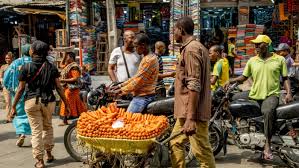The Nigeria Union of Hawkers (NUH) has called on the Federal Government and state governments across the country to take urgent steps to protect the rights of hawkers and improve their working conditions. This appeal was made as the country joined the global community to mark the 2025 International Hawkers’ Day, celebrated annually on May 26.
In a statement issued by the National President of the union, Comrade Babalola, the NUH stressed the need to formally recognise hawking as a legitimate form of entrepreneurship. This year’s theme, “Empowering Street Entrepreneurs: Dignity, Rights, and Recognition,” focused on the struggles of hawkers and the informal sector in Nigeria.
Comrade Babalola explained that over 15 million Nigerians are engaged in hawking, including many unemployed graduates and struggling families. According to him, hawking has provided a vital lifeline for millions who would have otherwise been trapped in poverty. “Hawking has empowered more than 15 million Nigerians. It’s time the government sees it as a genuine business and puts in place policies that protect hawkers rather than punish them,” he said.
He lamented that hawkers continue to face several threats daily, ranging from extortion and harassment by law enforcement agencies to a lack of legal recognition and dangerous working environments. He pointed out that these challenges have left many street traders vulnerable and unable to operate freely or safely in many parts of the country.
The NUH president pledged that the union would continue to resist policies that seek to displace or exploit hawkers. “We will keep fighting against eviction, extortion, and unfair regulations. We believe in inclusive development that uplifts every Nigerian, especially those working hard in the informal economy,” he said.
Babalola also raised concern over the growing presence of children in street trading. He described the trend as a form of child labour, warning that it exposes minors to exploitation, criminal elements, and severe risks. “While hawking puts food on the table for many families, children should not be subjected to such dangerous environments. This is something the union is strongly against,” he added.
In its efforts to organise and protect members, the NUH has started creating a national database for hawkers, which includes proper identification records. This move, according to Babalola, will help monitor activities, discourage underage hawking, and improve the welfare of genuine street traders.
As part of its initiatives, the union is also working on providing medical support, educational scholarships, and skills training for its members. “We want to build a system where hawking is not just a means to survive, but a dignified trade. Our guidelines will help reduce abuse and promote a safer, more productive trade environment,” he said.
The union praised the state governments of Cross River, Anambra, Niger, Borno, Kano, and Ebonyi for what Babalola described as their “unflinching support and financial assistance” towards hawkers. He urged other state governors to follow suit by collaborating with the NUH to create infrastructure that supports hawkers and ensures their safety.
Babalola also called for hawker-friendly policies and investments in informal economy infrastructure, such as designated vending areas, clean water access, and mobile health services, to help hawkers thrive.
International Hawkers’ Day, celebrated globally on May 26, recognises the role of hawkers in supporting local economies, cultures, and communities. This year marked Nigeria’s first official celebration of the day, and NUH used the occasion to amplify the voices of hawkers nationwide.
Many Nigerians depend on street trading to survive, especially in urban and semi-urban areas. From fruits and snacks to clothing and electronics, hawkers are found in nearly every corner of Nigeria, offering low-cost goods and essential services. Despite their significant contribution to the economy, hawkers often operate in fear of arrest, fines, or confiscation of their goods.
Stakeholders have continued to call on the government to engage unions like NUH in policy-making and urban planning, to ensure hawkers are not pushed further into poverty or criminalised for trying to earn a living.
